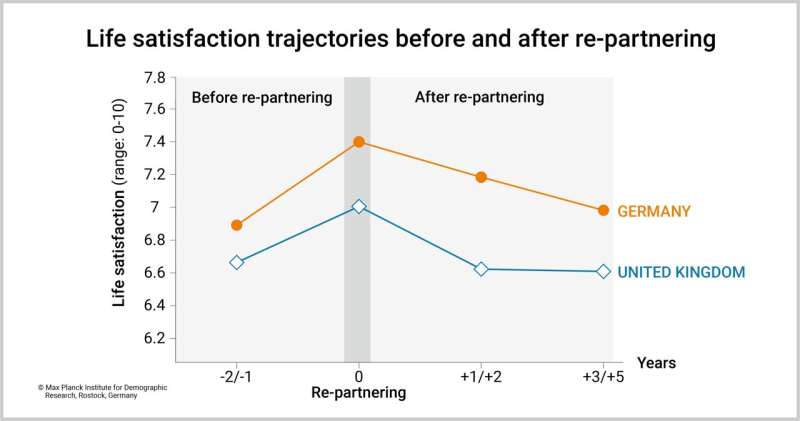This article has been reviewed according to Science X's editorial process and policies. Editors have highlighted the following attributes while ensuring the content's credibility:
fact-checked
peer-reviewed publication
trusted source
proofread
New partnerships found to improve life satisfaction for single mothers

Ideally, a family is a protective space, a social network, and a team that supports each other. But what happens when children are raised by a single mother instead of two parents? Single mothers in particular can face significant challenges regarding their mental health and overall life satisfaction. Previous studies have shown that compared to two-parent families, they have poorer mental health and are less satisfied due to increased stress, financial insecurity, and smaller social networks.
A recent study by researchers from the Max Planck Institute for Demographic Research (MPIDR) and Tilburg University showed how starting a new partnership can affect the health and satisfaction of single mothers. The findings are published in the Journal of Marriage and Family.
Phillipp Dierker, author of the study and doctoral student at MPIDR, along with his co-authors Mine Kühn and Mikko Myrskylä (MPIDR), compared the situation of single mothers in Germany and the UK for their study. Dierker says, "We compared data from these countries because the social systems for single parents are different. In the UK, the net cost of caring for a child is generally higher, and single mothers are more likely to face unemployment and poverty compared to those in Germany."
"However, this does not mean that the situation of single mothers in Germany is good," emphasizes Dierker. The study used data from the German Socio-Economic Panel Study (SOEP) from 1984 to 2020 and from the British Household Panel Study and the UK Household Longitudinal Study (UKHL) from 1996 to 2020. To be included in the study, the mother, children (under 18) and a new partner had to live together in the same household.
Greater life satisfaction through financial relief
"We used longitudinal data to examine how the arrival of a new partner in the household affects mothers' mental health and life satisfaction. One initial hypothesis was that mothers' well-being would increase due to increased social, emotional, and financial resources.
"However, the opposing hypothesis suggests that there would be more conflict with a new partner in the household, for example, because they would not get along with the children or would bring their own children from previous partnerships," explains the researcher. Dierker also noted that frequent partner changes could also be a burden for the mother.
In Germany, mothers' life satisfaction was improved with a new partnership, mainly due to increased income. In the United Kingdom, a positive correlation was also observed. "The data show that the improved financial situation, along with emotional support, significantly contribute to a better perception of one's own situation," the scientist explains.
When comparing single mothers who maintain a long-term relationship with mothers who frequently change their relationship status, mothers in long-term relationships report higher life satisfaction. In Germany, mothers who separate or change partners within five years of starting a relationship have significantly less decline in life satisfaction than in the UK.
"We attribute this to the fact that state support for single mothers is lower in the UK, while child support costs are higher. The unstable availability of resources may therefore place a greater burden on mothers in the UK than in Germany," says Dierker.
Single parents in both countries do have more financial resources when they start a new partnership. "However, for mothers, a new partner generally does not relieve them of household chores in either country. On the contrary, they spend even more time doing household chores. Additional Financial resources and the feeling of financial security are currently the only contributing factors that can explain substantial parts of the increase in life satisfaction after a new partner," summarizes Dierker.
This highlights how much more difficult the situation is for single parents and that they need much more institutional support than is currently the case in either country. The overall conditions for financial independence of single parents, such as reliable child care, need to be established to enable them to engage in gainful employment.
More information: Philipp Dierker et al, Re‐partnering and single mothers' mental health and life satisfaction trajectories, Journal of Marriage and Family (2024). DOI: 10.1111/jomf.13015
Journal information: Journal of Marriage and Family
Provided by Max Planck Institute for Demographic Research




















